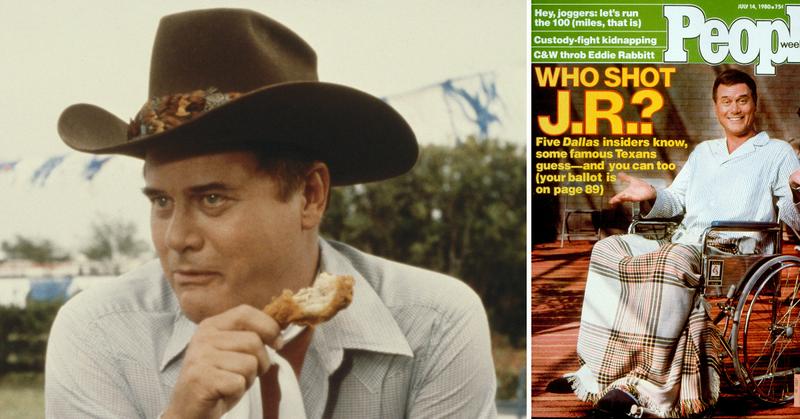When 'Dallas' Left Us All Asking 'Who Shot JR?'
By | May 21, 2019

In 1980, everyone wanted to know: "Who shot J.R.?" Dallas posted the question by showing us the shooting of J.R. Ewing (Larry Hagman), and drove fans of the soap opera all over the world mad with curiosity and anticipation.
He was the villain viewers loved to hate -- and they couldn't imagine the show without him. Plenty of characters on the show wanted him dead, but audiences didn't.
In all of '80s TV, this one catchphrase looms largest, not because it's simple and intriguing, but because it sums up the greatest cliffhanger the medium has ever seen. President Jimmy Carter and presidential hopeful Ronald Reagan weighed in on Who shot J.R.? Beer branded "J.R." was sold with a variation on the question. Posters, magazine covers, coffee mugs, buttons, and T-shirts all asked the same thing: Who shot J.R.?
Dallas Was Hugely Popular, Thanks To Its Villain

Dallas was a bit of an accidental success. It began as a five-part miniseries on April 2, 1978. The mini-series was not an instant success, but it did come back for a full season and gradually found a following. The show became a staple of Friday television. Because of its structure and themes, it was called a “primetime soap opera.” The story focused on two families caught in a feud: the Barnes and the Ewings. The feud, over ownership of oil fields, began when Digger Barnes accused Jock Ewing, his former partner, of stealing oil fields. Ewing also stole the love of Barnes’ life. With her, Jock Ewing had three sons: Bobby, the youngest son who married Digger’s daughter Pam, Gary, the overlooked middle son, and J.R., the villain at the center of the mystery that the world focused on in 1980.
The Deed Is Done

J.R., played by Larry Hagman, was one of the most despised characters on TV. He was a womanizer and a vicious businessman who drove his enemies out of business. He damaged everyone around him, including his wife, who became an alcoholic. The whole time he committed his dastardly acts with a twinkle in his eye, making him seem all the more nefarious. In the season three finale, he sat alone in a dark office, drinking coffee. He heard a noise, and called out “who’s there?” Two shots rang out, leaving the audience to theorize about the identity of the culprit. Some even speculated that J.R. may have been killed off.
The Audience Is Left Hanging

On March 21, 1980, the third season ended, leaving millions wondering: “Who shot J.R.?” This simple line spawned memorabilia, including t-shirts and mugs. CBS used the line to promote the show. Because of the timing of the cliffhanger, which was during an election year, the Republicans created buttons that claimed that “A Democrat shot J.R.” Jimmy Carter quipped that he could easily fund his campaign if he knew who shot J.R. Although people wanted to know who killed J.R., they didn’t love the character.
A Villain's Death

The next season did not begin with an answer to the question but instead waited until four episodes in. The night that the episode revealing the identity of the would-be murderer aired, November 21, 1980, 76% of American households tuned in to find out the answer to the question.
The Mystery Is Solved

So who did shoot J.R.? Kristin Shepard, J.R.’s sister-in-law and former mistress, who, incidentally, escaped punishment because J.R. did not press charges. She was, after all, pregnant with J.R.’s child.
After The Mystery Is Solved

Dallas, which ran for a total of 14 seasons, became known for its cliffhangers after that, including the slightly ridiculous cliffhanger when Bobby, the younger brother, steps out of a shower after being killed off in a car accident. That particular plotline was resolved by writing off the entire season after his death as just a dream. In the same way that the show has had a lasting impact on primetime television, spawning similar shows that follow the drama serialization format, the Dallas cliffhangers have created a television trend. It even inspired the Simpsons’ season 6 cliffhanger, “Who Shot Mr. Burns Part 1.” Appropriately, Dallas finished out its primetime run with a cliffhanger.
